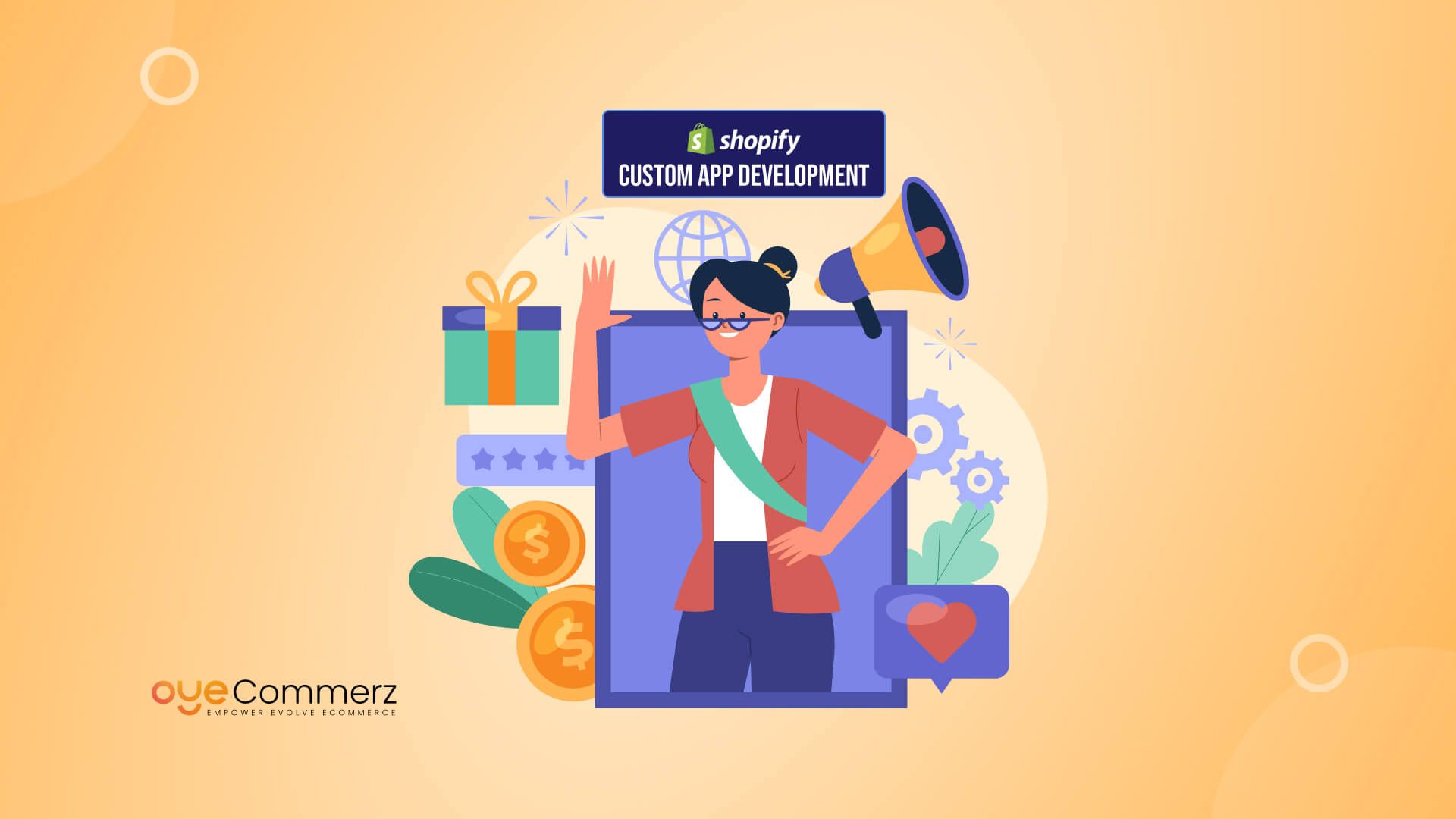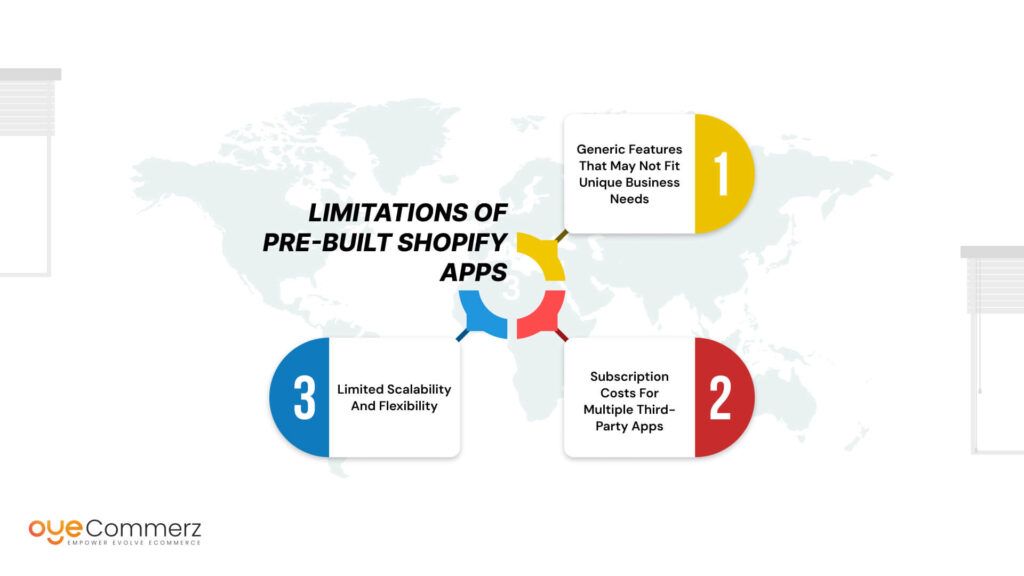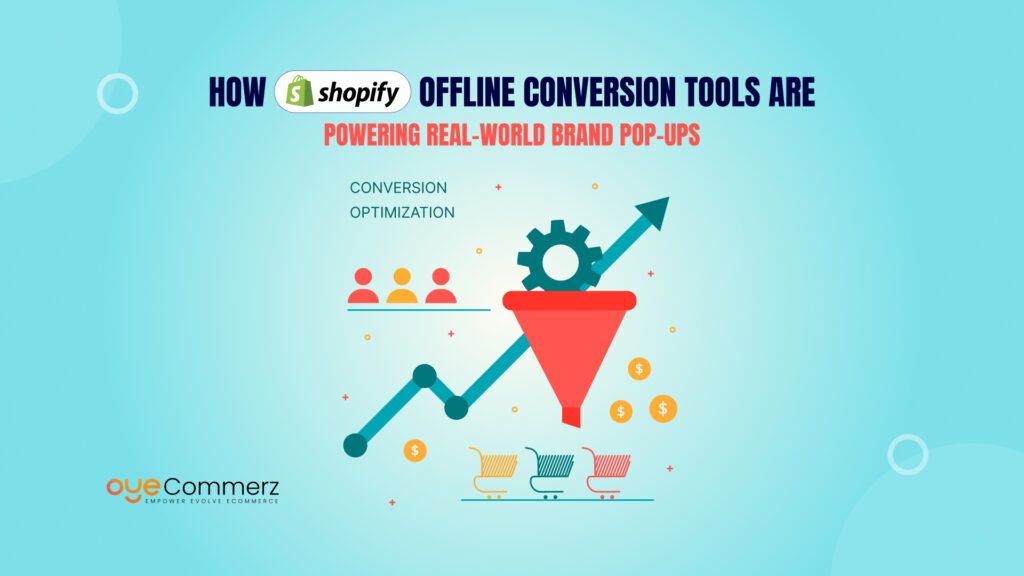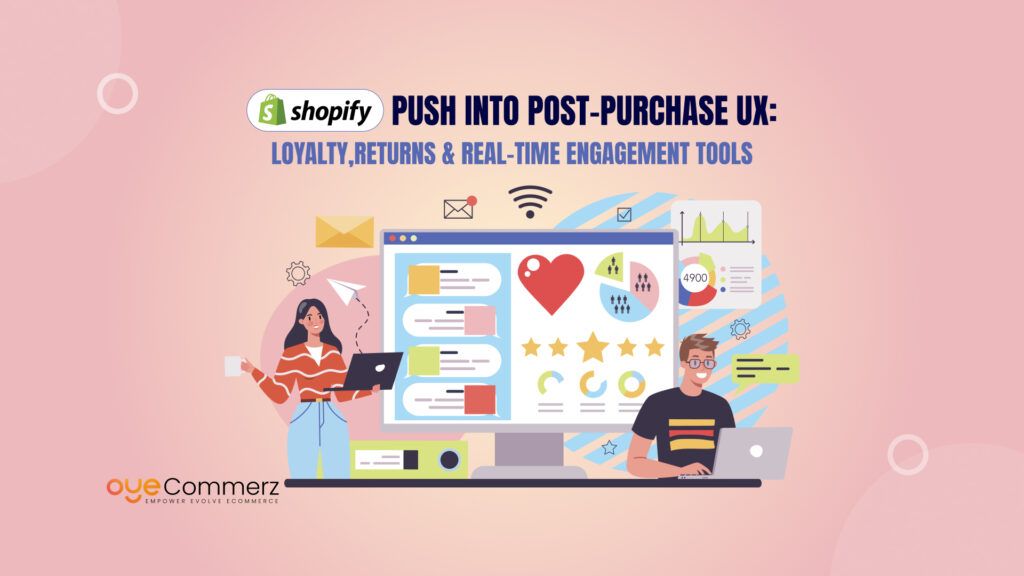In the fast-paced world of eCommerce, having a Shopify store is no longer enough to stay ahead of the competition. With thousands of online stores vying for customer attention, businesses need to offer unique experiences that cater to their audience’s needs. While Shopify’s default features are powerful, they often fall short when businesses require highly specific functionalities. This is where Custom Shopify App Development comes into play.
Unlike off-the-shelf Shopify apps, custom apps are designed specifically for a store’s unique requirements. They allow merchants to go beyond the limitations of generic apps, offering personalized experiences, streamlined operations, and better integrations with existing systems. Whether it’s creating a custom checkout process, integrating a third-party API, or automating inventory management, custom Shopify apps provide solutions that are tailored to business growth.
Businesses opt for Shopify App Development because it enables them to scale their operations without being constrained by the limitations of pre-built apps. A well-designed Shopify custom app enhances efficiency, reduces operational costs, and offers an edge over competitors. As eCommerce trends evolve, investing in custom app development becomes a necessity rather than a luxury.
Table of Contents
ToggleBrief Overview of Shopify as a Leading eCommerce Platform
Shopify has grown to become one of the most preferred eCommerce platforms worldwide, serving millions of businesses across various industries. Its user-friendly interface, extensive customization options, and seamless integrations make it the go-to choice for entrepreneurs, small businesses, and large enterprises alike. Unlike other platforms that require heavy coding knowledge, Shopify allows store owners to set up and manage their online business with minimal technical expertise.
One of Shopify’s biggest advantages is its vast Shopify App Store, which offers thousands of pre-built applications that extend a store’s functionality. From marketing tools and SEO optimizations to customer relationship management (CRM) and advanced analytics, Shopify apps empower merchants to improve their store’s performance. However, as businesses grow, they often find that these standard apps do not fully meet their requirements, leading them to explore custom Shopify app development solutions.
With its cloud-based infrastructure, Shopify ensures high security, speed, and reliability, making it a favorite among eCommerce business owners. It also provides built-in SEO tools, mobile responsiveness, and multi-channel selling capabilities, further solidifying its position as a leader in the eCommerce industry. But to unlock its full potential, businesses often need custom features that align with their specific workflows, and this is where custom Shopify apps prove invaluable.
The Importance of Apps in Enhancing Shopify Store Functionality
A Shopify store’s success depends on more than just its design and product selection. To deliver a seamless shopping experience, businesses need apps that automate processes, enhance customer engagement, and streamline operations. While Shopify offers various built-in features, businesses often require custom functionalities that cater to their unique operational needs. This is why Shopify app development is essential for growing online businesses.
Custom Shopify apps allow businesses to optimize their workflows by automating repetitive tasks such as inventory management, order processing, and customer support. For example, instead of manually updating stock levels, a custom inventory management app can sync inventory in real-time across multiple warehouses. Similarly, an automated order processing app can reduce fulfillment errors and improve efficiency.
Moreover, apps play a crucial role in enhancing customer experience. A personalized recommendation engine powered by AI can suggest relevant products based on a customer’s browsing history, increasing conversion rates. Custom loyalty programs, subscription models, and gamified discount systems can help businesses retain customers and boost sales.
For businesses that require advanced analytics, a custom Shopify app can provide real-time insights into sales, customer behavior, and marketing performance. These insights help merchants make data-driven decisions, refine their strategies, and optimize their store’s profitability.
While pre-built Shopify apps offer basic functionality, they often come with limitations such as high monthly fees, unnecessary features, and compatibility issues with other tools. Custom Shopify app development ensures that businesses get exactly what they need without relying on third-party providers, giving them more control over their store’s performance and growth.
Limitations of Pre-Built Shopify Apps
1. Generic Features That May Not Fit Unique Business Needs
One of the biggest drawbacks of using pre-built Shopify apps is that they are designed with a one-size-fits-all approach. While these apps may offer standard features like inventory management, marketing automation, and SEO enhancements, they often lack the customization required to address unique business workflows.
For example, a clothing brand that sells custom-made outfits may need a dynamic product customization tool that allows customers to select fabric, colors, and styles. A generic product configurator app may not offer the precise functionality needed, leading to a compromised user experience. Similarly, a subscription-based business might require a custom recurring billing system that aligns with its pricing model, something that standard Shopify subscription apps may not provide.
With Custom Shopify App Development, businesses can create tailor-made solutions that perfectly align with their operations. Whether it’s a custom loyalty program, an AI-powered recommendation engine, or an advanced analytics dashboard, a custom Shopify app ensures that businesses are not limited by the constraints of third-party apps.
2. Subscription Costs for Multiple Third-Party Apps
Using multiple pre-built Shopify apps may seem convenient at first, but the costs can quickly add up. Many Shopify apps operate on a subscription-based model, meaning businesses must pay monthly fees to access their features. The more apps a store uses, the higher the operational costs.
For instance, a business might need separate apps for:
SEO optimization – $30/month
Customer reviews – $20/month
Advanced analytics – $50/month
Loyalty programs – $40/month
Custom checkout – $25/month
Before long, these expenses can exceed hundreds of dollars per month, significantly impacting a store’s profitability. Moreover, some premium apps charge based on store revenue or order volume, meaning costs can increase as sales grow.
By investing in Shopify App Development, businesses can eliminate the need for multiple third-party subscriptions. A custom Shopify app consolidates multiple functionalities into a single, one-time development investment. This not only reduces costs in the long run but also provides businesses with full control over their app’s features, updates, and scalability.
3. Limited Scalability and Flexibility
Another major limitation of pre-built Shopify apps is their lack of scalability. Many third-party apps are designed for small to mid-sized businesses and may not support high-growth enterprises. As a business expands, its operational needs become more complex, requiring advanced automation, API integrations, and custom workflows that generic apps simply cannot provide.
For example, a Shopify Plus merchant managing thousands of daily orders might need:
A custom order management system that automates bulk processing
Integration with multiple warehouses and shipping carriers
A real-time inventory tracking system to prevent stockouts
Most third-party Shopify apps cannot handle enterprise-level operations, leading to inefficiencies, performance issues, and frequent app downtimes. Additionally, businesses relying on third-party apps are at the mercy of external developers who may discontinue support, release updates that break compatibility, or limit features in their free version.
With Custom Shopify App Development, businesses can build scalable, flexible, and high-performance solutions that grow with them. A custom app can be continuously improved and optimized based on business needs, ensuring that a Shopify store remains competitive and efficient at every stage of growth.
Advantages of Custom Shopify Apps
As eCommerce businesses evolve, they require solutions that go beyond the limitations of pre-built apps. Custom Shopify App Development provides businesses with tailored solutions that enhance performance, improve user experience, and offer greater control over store operations. Unlike generic Shopify apps, which serve a broad audience, custom Shopify apps are built specifically for a business’s needs, ensuring better efficiency, seamless integrations, and long-term scalability.
Let’s explore two major advantages of custom Shopify apps: better performance & integration and ownership & control over features.
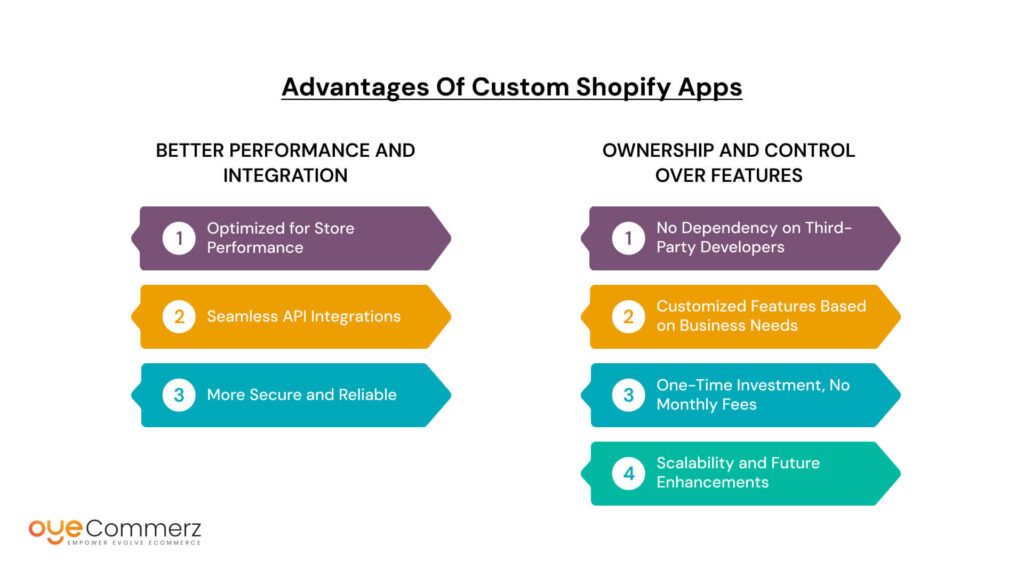
1. Better Performance and Integration
One of the biggest challenges of using multiple third-party Shopify apps is that they do not always work seamlessly together. Many pre-built apps are developed by different vendors, leading to compatibility issues, slow performance, and even unexpected breakdowns when updates roll out. A slow or unresponsive Shopify store can negatively impact the user experience, leading to higher bounce rates, lower conversions, and lost revenue.
With Custom Shopify App Development, businesses can build apps that are optimized for speed, reliability, and seamless integration with their existing systems. Here’s how:
Optimized for Store Performance
Pre-built apps often come with unnecessary code and features that a business may not need. This extra code can slow down the Shopify store’s load time, affecting customer experience and SEO rankings. A custom Shopify app is designed with only the required features, ensuring faster performance and better efficiency.
Seamless API Integrations
Many businesses rely on external platforms such as CRM systems, ERP solutions, accounting software, or third-party logistics (3PL) providers. A custom Shopify app allows for smooth integration with these platforms, ensuring real-time data synchronization and automation.
For example, a custom Shopify app can integrate:
- Inventory management systems for real-time stock updates
- Payment gateways for custom checkout processes
- Shipping carriers for automated shipping rate calculations
- Marketing tools for advanced customer segmentation
- Eliminates Conflicts Between Multiple Apps
Using multiple third-party apps often results in conflicts and glitches that can slow down a store or break important functionalities. A custom Shopify app eliminates this issue by consolidating multiple features into a single, well-optimized solution, reducing the need for multiple external applications.
More Secure and Reliable
Security is a major concern for any eCommerce business. Since third-party apps store data externally, there’s always a risk of data breaches or compatibility issues when an app gets discontinued or stops receiving updates. Custom Shopify apps ensure that sensitive customer and business data remains secure and under full control.
In short, a custom Shopify app provides better performance, faster store loading times, seamless API integration, and enhanced security, ensuring that businesses run smoothly without disruptions.
2. Ownership and Control Over Features
When businesses rely on third-party Shopify apps, they do not own the app—they are simply paying for access to its features. This creates several challenges, such as limited customization, forced feature updates, and vendor dependency. With Custom Shopify App Development, businesses gain complete ownership and control over their app’s functionalities.
No Dependency on Third-Party Developers
Pre-built Shopify apps are controlled by external developers, meaning:
- Updates are released based on the app vendor’s schedule, not the business’s needs.
- Features may change or be removed without notice.
- The app may be discontinued, forcing businesses to find an alternative.
With custom Shopify app development, businesses are not at the mercy of third-party providers. They have full control over updates, security patches, and feature enhancements, ensuring the app evolves alongside business growth.
Customized Features Based on Business Needs
A major downside of pre-built Shopify apps is that they often come with unnecessary features, which can clutter the interface and slow down performance. With a custom Shopify app, businesses get only the features they need, eliminating distractions and ensuring a smooth, efficient user experience.
For example, a business may require:
- A custom discount system that applies automatic discounts based on customer purchase history.
- A loyalty program that integrates with a unique rewards structure.
- A personalized checkout process that supports multiple payment gateways and customer-specific pricing.
None of these features may be fully available in third-party apps, but a custom Shopify app ensures businesses get exactly what they need.
One-Time Investment, No Monthly Fees
Most Shopify apps charge monthly or yearly subscription fees, leading to high recurring costs. In contrast, a custom Shopify app is a one-time investment, with optional maintenance costs. This means businesses own the app permanently, eliminating unnecessary expenses over time.
Scalability and Future Enhancements
As a business grows, its operational needs evolve. A custom Shopify app can be continuously updated and scaled to support:
- More complex order processing workflows
- AI-powered automation tools
- Multi-store integration for global selling
Unlike pre-built apps that may limit feature expansion, a custom Shopify app evolves with the business, ensuring long-term scalability and flexibility.
Exclusive Features Available Only with Custom Shopify Apps
As eCommerce competition continues to rise, businesses need customized solutions that go beyond Shopify’s default features. While pre-built Shopify apps offer generic functionalities, custom Shopify apps provide tailored features that enhance user experience, streamline operations, and increase conversions.
From personalized shopping experiences to advanced inventory management, custom Shopify apps unlock a world of exclusive capabilities. Let’s explore some of the standout features that are only possible with Custom Shopify App Development.
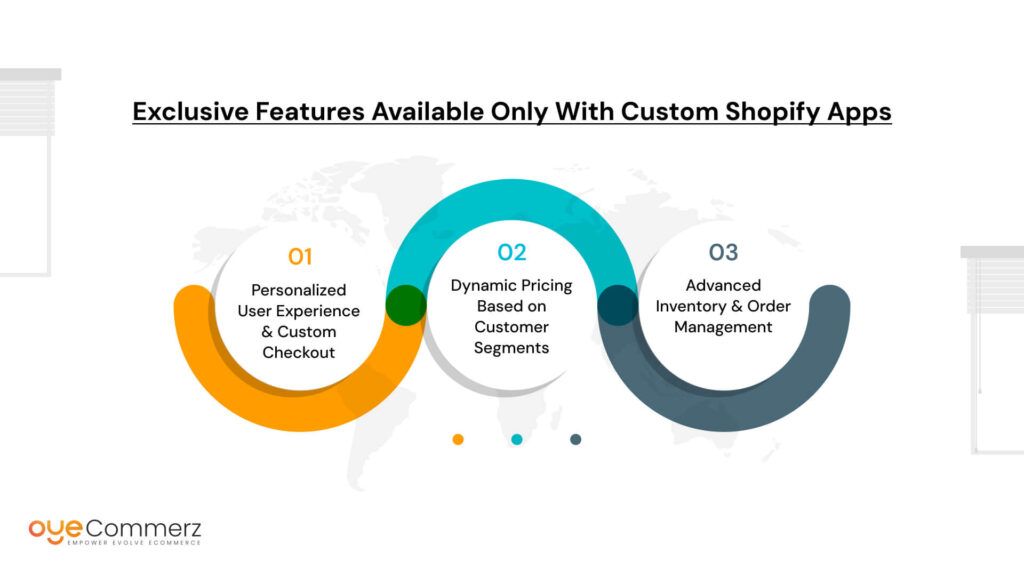
Personalized User Experience & Custom Checkout
Personalization is key to boosting sales and retaining customers. One of the most powerful features that businesses can integrate into their Shopify store through custom Shopify app development is AI-powered product recommendations.
With Artificial Intelligence (AI) and Machine Learning (ML), a custom Shopify app can analyze: Customer browsing history (products viewed, categories visited)
Purchase behavior (past orders, abandoned carts)
Engagement patterns (click-through rates, time spent on pages)
- Using this data, the app can dynamically suggest highly relevant products to each customer. For example:
If a customer frequently purchases sports gear, the app can suggest new arrivals in the same category. - If a user abandons a cart, an AI-powered app can trigger a personalized email reminder with a discount offer.
- If a shopper buys a smartphone, the app can recommend related accessories like screen protectors and cases.
Unlike generic recommendation apps, which use broad rules, a custom AI-driven recommendation engine is specifically trained to match a store’s unique inventory and customer behavior, increasing conversions and average order value (AOV).
Dynamic Pricing Based on Customer Segments
One of the most exclusive benefits of custom Shopify apps is the ability to implement dynamic pricing strategies tailored to different customer groups. Unlike static pricing models, dynamic pricing adjusts in real-time based on factors such as:
Customer purchase history (loyalty discounts for repeat buyers)
User type (wholesale buyers vs. retail customers)
Location-based pricing (regional price variations)
Supply & demand (limited-stock items can be priced higher)
For example:
VIP customers can automatically receive a 5% discount on all purchases after hitting a certain spending threshold.
B2B buyers can see wholesale prices instead of standard retail prices.
During high-traffic hours, prices can increase dynamically to maximize revenue.
This feature ensures businesses maximize profitability while offering exclusive pricing incentives to loyal customers. With a custom Shopify app, merchants gain full control over pricing strategies, ensuring they remain competitive without relying on third-party pricing tools.
Automated Order Processing and Fulfillment Rules
Handling high-volume orders manually is time-consuming and prone to errors. A custom Shopify app can automate order processing from the moment a customer places an order to final shipment, ensuring fast, accurate, and hassle-free fulfillment.
- Order Prioritization – The app can automatically prioritize high-value or time-sensitive orders, ensuring they get processed first.
- Automated Fraud Detection – Custom apps can flag suspicious transactions based on predefined security rules.
- Split Orders by Warehouse – If a business has multiple warehouses, a custom app can automatically route orders to the closest fulfillment center, reducing shipping time and costs.
- Auto-Generated Shipping Labels – Instead of manually entering shipping details, the app can integrate with carriers like FedEx, UPS, and DHL to generate shipping labels instantly.
- Real-Time Order Tracking – Customers receive automated tracking updates, reducing support requests.
Unlike off-the-shelf order management apps, a custom-built solution is tailored to a business’s specific workflow, ensuring faster processing, lower errors, and improved efficiency.
How Custom Shopify Apps Give You a Competitive Edge
In the fast-moving world of eCommerce, staying ahead of the competition requires more than just a great product—it demands innovation, efficiency, and a seamless shopping experience. While Shopify offers an extensive range of pre-built apps, these often fall short when a business starts to scale or requires unique features tailored to its specific needs.
With Custom Shopify App Development, businesses gain a strategic advantage by enhancing store functionality, automating operations, and offering personalized customer experiences. One of the most significant benefits of custom Shopify apps is their ability to scale and adapt as your business grows.
Scalability and Adaptability as Your Business Grows
A major challenge with off-the-shelf Shopify apps is their lack of flexibility when a business expands. Many third-party apps are designed for small to mid-sized stores, and their features may not support high-traffic volumes, complex workflows, or enterprise-level integrations.
With Custom Shopify App Development, businesses can future-proof their operations by building scalable solutions that grow alongside them. Here’s how a custom Shopify app gives you an edge:
- Handles High Order Volumes – As sales increase, a custom app ensures seamless performance without slowing down your store or creating processing delays.
- Expands with Multi-Store Integration – If you operate multiple Shopify stores or expand internationally, a custom app can sync inventory, orders, and customer data across all stores, ensuring a unified experience.
- Adapts to Changing Market Trends – Unlike pre-built apps that come with fixed features, a custom Shopify app can be modified to include new functionalities, AI-powered automation, and updated APIs based on your evolving business needs.
- Integrates Seamlessly with Third-Party Systems – Whether you need to connect with a CRM, ERP, warehouse management system, or supplier database, a custom-built Shopify app ensures smooth data synchronization.
- Eliminates the Risk of App Shutdowns – With third-party apps, you rely on external developers who might discontinue support or make changes that affect your store. A custom Shopify app gives you complete control, eliminating the risks associated with external app dependency.
Steps to Develop a Custom Shopify App
Developing a custom Shopify app requires a strategic approach to ensure it meets business needs, integrates seamlessly, and delivers the desired results. Below is a step-by-step guide to building a successful custom Shopify app.
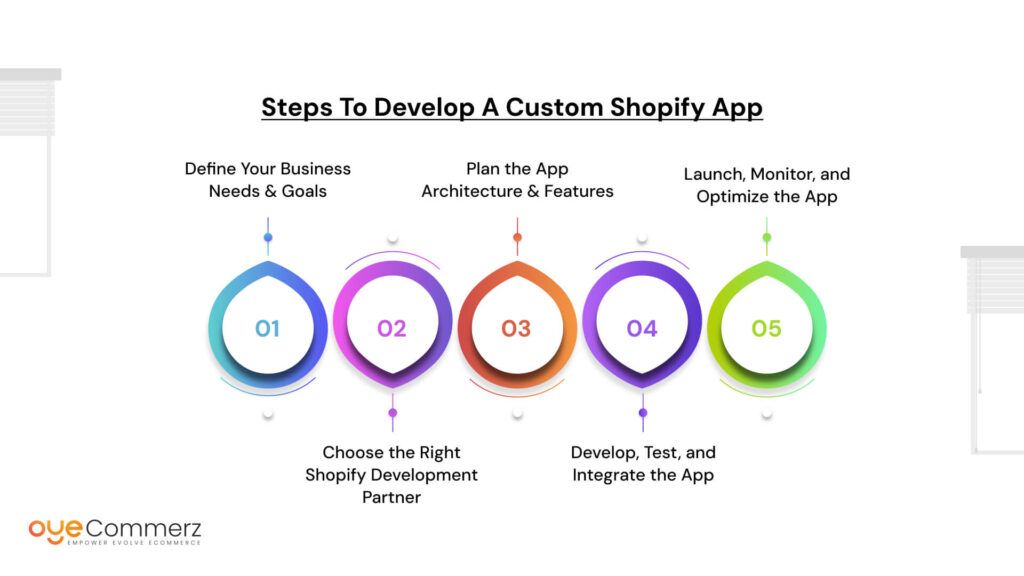
Step 1: Define Your Business Needs & Goals
Before diving into Shopify App Development, it’s crucial to outline:
What challenges you want to solve (e.g., inventory automation, customer segmentation, advanced reporting)
- What features you need (e.g., AI-powered recommendations, dynamic pricing, custom checkout)
- Who will use the app (e.g., store admins, customers, fulfillment teams)
- How it will integrate with your existing Shopify store and third-party platforms
Step 2: Choose the Right Shopify Development Partner
Building a custom Shopify app requires technical expertise, industry experience, and a deep understanding of the Shopify ecosystem. When choosing a Shopify app development company, consider the following:
- Experience in Shopify App Development – Check their portfolio for previously developed Shopify apps.
- Expertise in API integrations – Ensure they have experience with Shopify APIs, payment gateways, and third-party tools.
- Client reviews and testimonials – Look for feedback from businesses that have used their services.
- Post-launch support and maintenance – Confirm whether they offer ongoing support, bug fixes, and updates.
Step 3: Plan the App Architecture & Features
Once the development partner is selected, the next step is to design the app architecture and feature set. This includes:
- Defining the core features and functionalities
- Planning database structure and API connections
- Choosing the technology stack (Node.js, Ruby on Rails, Laravel, etc.)
- Ensuring mobile responsiveness and cross-platform compatibility
Step 4: Develop, Test, and Integrate the App
After planning, the development phase begins. This involves:
- Coding and building the app based on Shopify’s best practices
- Implementing API connections to Shopify and third-party platforms
- Testing for bugs, errors, and performance issues
- Ensuring a seamless user experience across different devices
Step 5: Launch, Monitor, and Optimize the App
Once the app is fully developed and tested, it’s time to launch it on your Shopify store. However, post-launch optimization is equally important:
- Monitor performance to ensure the app functions without glitches
- Analyze user feedback to identify improvement areas
- Release updates and enhancements based on business growth
- Fix bugs or issues that arise post-launch
Looking to build a Custom Shopify App? Get a tailor-made solution that enhances your store’s functionality, automated workflows, and increases revenue. Contact our Shopify development experts today.
Ready to Migrate to Shopify ? Let Us Help You Make the Switch!
Conclusion
A custom Shopify app is the ultimate solution for businesses looking to scale, automate operations, and enhance customer experience beyond the limitations of pre-built apps. By integrating AI-powered recommendations, dynamic pricing, automated o rder processing, and seamless third-party integrations, businesses gain full control, better performance, and long-term cost savings. Unlike generic apps, a custom-built Shopify solution grows with your business, ensuring higher efficiency, increased conversions, and a competitive edge in the eCommerce market. Investing in custom shopify app & Shopify Web development is not just an upgrade, it’s a smart strategy for sustained success. Contact Us today.

